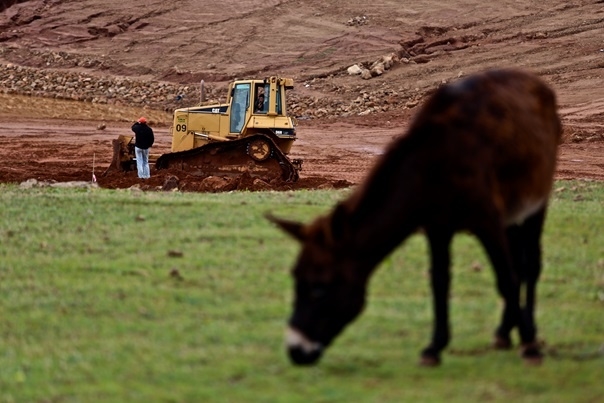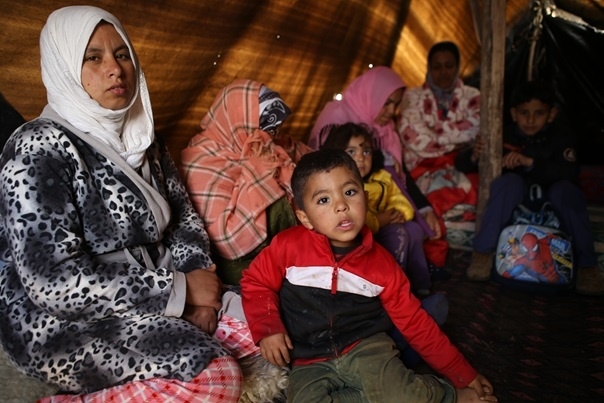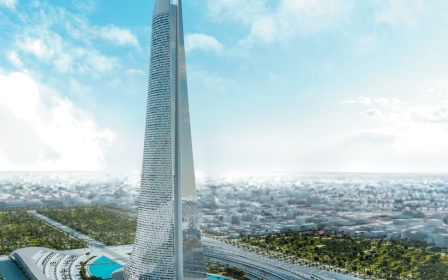Moroccan tribes resist eviction by real estate corporations

RABAT, Morocco - Sitting in a tent made of plastic sheeting, Mbarka Lqsira holds her baby in one hand while feeding yogurt to another child with the other. She listens intently as the other women from the Guicheloudaya tribe proclaim their frustration with the Makhzen - the state.
“They are treating us like Israel treats Palestinians,” exclaims one of the women, as another waves her outdated identity card. “They won’t even accept this address anymore, I can’t even renew my identity card.” Others chime in, pointing to their bruises and recalling how they were beaten with police truncheons earlier that day.
Outside, the men sit against a metal fence built around the land where their village, Ouled Dlim used to stand. Smoking cigarettes, they stare at the police buses a couple hundred metres away and murmur amongst themselves. One of the members of their tribe had tried to commit suicide just a few hours earlier during clashes with the police.
The Guicheloudaya are one of two tribes on the rural fringes of the Rabat-Salé metropolitan area who have been expelled from their traditional homelands by the two biggest real estate corporations in Morocco. Guicheloudaya land was purchased by Société d’Aménagement Ryad (SAR) while the other tribe, Ouled Sbita saw its lands sold to Addoha Group.
Real estate and the communal lands system
Addoha is a privately-owned corporation whose CEO Anas Sefrioui is close to the palace, particularly to Mounir Majidi - the king’s personal secretary. On the other hand, SAR is a real estate subsidiary of the CDG (Caisse de Dépot et Gestion), a financial institution controlled by the king.
Both corporations have managed to acquire land across Morocco for low prices. The state asserts that these land sales are legal since the property is considered “Ard al-Jum,” communal lands that belong to the state.
The communal lands system was introduced by the French colonial administration in a 1919 law that reorganised rural territories. The law dissolved tribal control of the land and made it the property of the Ministry of the Interior.
Under the 1919 act, each commune is governed by a Na’ib who is elected by the tribe. The Na’ib acts as the chief negotiator for land transactions within the tribe as well as between the tribe and the state. Today, the 1919 law is still in effect and applies to 15 million hectares of communal land which make up 40 percent of the entire country.
After Morocco began implementing neo-liberal policies in the early 1990’s, the state began to expel tribes from their homelands en masse. The land is often handed to major corporations who the government claims will create more economic value from it.
This expropriation has led to increasing criticism from anti-corruption NGOs - who claim that these land grabs are often fraudulent - and activists that are frustrated with the destruction of Moroccan rural heritage.
The case of Guicheloudaya and Ouled Sbita have gained special attention due to their efforts in resisting state pressure by refusing to move from their land and organising demonstrations.
Guicheloudaya
Just south of the Rabat-Salé metropolitan area, Douar Ouled Dlim used to be located between the Rabat-Casablanca highway and some recently-constructed highrises in Rabat’s wealthy Hay Riad neighbourhood. It was entirely demolished in December 2014 by police-assisted bulldozers.
To maintain control, the Sultan proposed that they hand over their weapons in exchange for ownership of large plots of land that they can settle on permanently. The tribe accepted his proposal and have lived on that land ever since.
When France introduced the 1919 law on communal lands, they redefined Guich land as communal land. Encompassing the entire area around Rabat, the administrative capital, Guich territory was strategic. Hence, the redefinition of the land as communal land facilitated its appropriation by the French authorities in order to expand the urban area.
However, in a 1946 act issued by King Mohammed V, the land was taken from the Ministry of the Interior and redesignated as the property of the Guich. This act was then invalidated under the reign of Hassan II when it was supposedly lost by the archives.
The existence of the law can only be found in popular memory and in official documents referring to it, neither of which are sufficient to prove that the land belongs to the Guich. This made it possible for Rabat to expand even further.
The destruction of the village of Ouled Dlim was the most recent annexation, with more planned in the upcoming years.
According to Mbarka Lqsira, 126 families have not received any compensation for their loss. Following the destruction of the village some of the families moved to live with relatives in other towns while others still live on the street.
However, some have pitched tents and remain on the land to protest the lack of compensation from the state. “We were living in simple houses but we were living a life of dignity. When they destroyed our houses we were forced to live in tents made of plastic sheets” explains Mbarka.
So far, several villagers have been arrested while others suffer from injuries from clashes with the police. “They can try every method to chase us from our land, but we can’t leave. We have nowhere to go, we will stay here until they find a just solution for us,” says Driss Daoudi whose house was demolished last March.
With their camp entirely burnt down in the latest police raid this week, the residents of Douar Ouled Dlim are looking into using legal channels to obtain compensation.
Ouled Sbita
On the other side of the city, between Salé and Kenitra, the Ouled Sbita tribe consists of approximately 300 families who live off subsistence agriculture and livestock. The tribes’ elders claim their tribe has lived there since the reign of Sultan Moulay Ismail in the 17th century.
In 2007, the Ouled Sbita were approached by state officials who wanted to purchase parts of their land that touched the coast. They initially agreed since their homes were not built near the beach and the sand does not make it possible to farm.
The land was sold by the Ministry of Interior to Addoha Group which was then asked to compensate the inhabitants 55 dirhams per square metre. Addoha is using it to build a golf course, luxury apartments, villas, a hotel and a mall.
When construction began, the inhabitants began to realise that the project extended far beyond the land they had agreed to sell. This realisation was confirmed when bulldozers started to approach homes in order to demolish them.
It was then that the Ouled Sbita began to resist against Addoha’s project. They claim that they are not being offered any indemnification for the buildings (farm houses, barns, etc.) that will be demolished. They also highlight the fact that only male heads of family are being compensated: young men and women who also have a stake in the land will not receive any indemnity.
But the lack of compensation isn’t the only issue. According to Saida Seqqat, an activist from the Ouled Sbita tribe, “Badr al-Haouzi, the Qayed has been asking us for bribes of 40,000 dirhams if we want to receive compensation. But we refuse to pay bribes to get what is ours.”
Seqqat explains that the Ouled Sbita refuse to stay silent about the issue. They are organising protests regularly. “Whenever they try to demolish a house we all march to it and surround it to block the bulldozer.”
However, despite the continued attempts to block the project. Addoha has already completed approximately 10 percent of construction.
Addoha could not be reached, SAR declined to comment.
Stay informed with MEE's newsletters
Sign up to get the latest alerts, insights and analysis, starting with Turkey Unpacked
Middle East Eye delivers independent and unrivalled coverage and analysis of the Middle East, North Africa and beyond. To learn more about republishing this content and the associated fees, please fill out this form. More about MEE can be found here.






